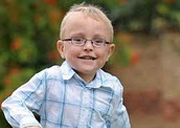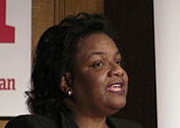Pro-lifers come in every age, gender, political persuasion, colour and faith

It is a well-known tactic for the pro-abortion movement to stereotype those who are pro-life. Most commonly, anyone who is pro-life is assumed to be religious and anti-feminist. This is a stereotype that needs to be regularly challenged.
It is important to hear pro-life defences from all sides. In fact, sometimes it can be beneficial not to argue the pro-life message from just a Christian viewpoint. If the person you’re talking to is not a Christian, then you may be facing two challenges: trying to convince them of the validity of Christianity and also trying to highlight the harms of abortion.
With these two points in mind, I was therefore interested to read an article about a group in the US called Secular Pro-Life, who have as their blog strapline: ‘You don’t have to be religious to understand that abortion is the killing of a human being’.
At a big atheist convention in the Washington D.C at the end of March, Secular Pro-Life set up an information table and began to mingle with the 25,000 or so participants there. One of the speakers at the convention claimed, to a round of applause and cheers, that: ‘The atheist community is a diverse community…We’ve got people here from all genders, races, religious backgrounds and sexual orientations’. However the representatives from Secular Pro-Life found this enthusiasm for diversity ended when it came to any discussion on abortion:
‘My pro-life atheist friends and I are a minority within the pro-life movement, and a minority among atheists…It takes courage to voice a minority view in an atmosphere like this.’ However, as one said: ‘…we will continue to be a voice. Atheists are diverse, and some of us believe that women’s rights can be had without sacrificing the lives of the smallest members of our species.’
It is useful to note some of the arguments this group are using to persuade their fellow atheists of the pro-life position:
‘As a secular pro-lifer I believe my case is scientifically and philosophically sound. Science concedes that human life begins at fertilization, so it follows that abortion is ageism and discrimination against a member of our own species, based on characteristics outside of their control.’ (my emphasis).
Elsewhere another expands: ‘A particularly productive conversation resulted after I helped one couple recognise that abortion is in fact ageism and discrimination. After all, why draw an arbitrary line that says that we will only grant personhood to beings who have achieved a certain point of function and development? They would not concede that abortion ought to be outlawed, but were willing to grant that society’s current approach to the problem is arbitrary.’
Along with arguments that abortion discriminates on the basis of age, Secular Pro-life also offer the following non-religious (but nevertheless familiar) reasons to oppose abortion in one of their flyers, ‘Is Abortion a Religious Issue?’:
- Abortion is a social justice issue
- You don’t have to be religious to care about social justice
- Most pro-lifers are not Catholic!
- Abortion violates the rights of unborn persons
- Abortion can cause permanent emotional and physical damage to women
- Science shows without doubt that unborn human beings are alive from conception
It is not just the atheists who are being challenged from within their movement. Another vociferous pro-abortion group, the feminists, are also finding some of the ground being taken from under them. The feminist establishment is generally regarded as the abortion establishment but within that there are increasing numbers who are pro-life, and prepared to stand up and say so. In the US once again this movement is more advanced and organised, particularly with the Feminists for Life organisation (it is worth checking out their website to see their arguments for being pro-life from a feminist perspective). Nevertheless in the UK, although less organised, there are some outspoken feminists who are prepared to stand publicly against abortion. For example, the journalist Madeleine Teahan writes in the Guardian that feminist advocacy of abortion has ultimately discriminated against women, through its use in sex selective abortions:
‘Initially, advocates of the right to choose an abortion were apparently motivated by a belief that it would mitigate against sexual discrimination and yet here we are, championing reproductive license at all costs, even when it attacks the very people it was meant to emancipate.’
She continues: ‘Oppression has many forms: the consumerism, individualism and competitiveness of British society – which lead women to “choose” to abort an unplanned child – can prove just as oppressive as the culture that values a man higher than a woman. What causes western feminists such discomfort when considering the question of sex-selective abortion is that it exposes the absence of genuine autonomy when women resolve to abort and takes the arguments so often churned out in favour of abortion to the ugliest of logical conclusions.’
Similarly, pro-life feminist, Fiorella Nash, was reported in the Catholic Herald a week or so ago highlighting how feminists are largely silent about ‘gendercide’, referring especially to the silence of feminists over the widespread practice of aborting baby girls in China. She simply questioned: ‘Whatever happened to the universal sisterhood?’
Unsurprisingly therefore, abortion is not simply a religious issue and there are both powerful arguments and vocal people that can make a clear case for being pro-life using secular arguments. Christians should have confidence that there are many effective arguments for being pro-life that makes sense to those who do not share our faith.
However, in the UK there are fewer non-religious organisations and individuals who are able and/or willing to bring these arguments into the public sphere than there are in the US.
My title for this blog reads: ‘Pro-lifers come in every age, gender, political persuasion, colour and faith’. One of the Secular Pro-life flyers lists no less than 28 pro-life groups that represent each of these sectors of society in the US, ranging from ‘Asian Youth for Life’, to ‘Students for Life of America’, to the ‘Pro-Life Alliance of Gays and Lesbians’. Is this a challenge for us in the UK? While we might have the various secular arguments noted here at our disposal, and a few secular organisations and individuals who are prepared to stand up and use them, what a powerful message it would send out to be able to illustrate even more clearly that pro-life arguments are not the preserve of the religious establishment and that abortion has a negative impact across all sectors of society.












Leave a Reply
Want to join the discussion?Feel free to contribute!